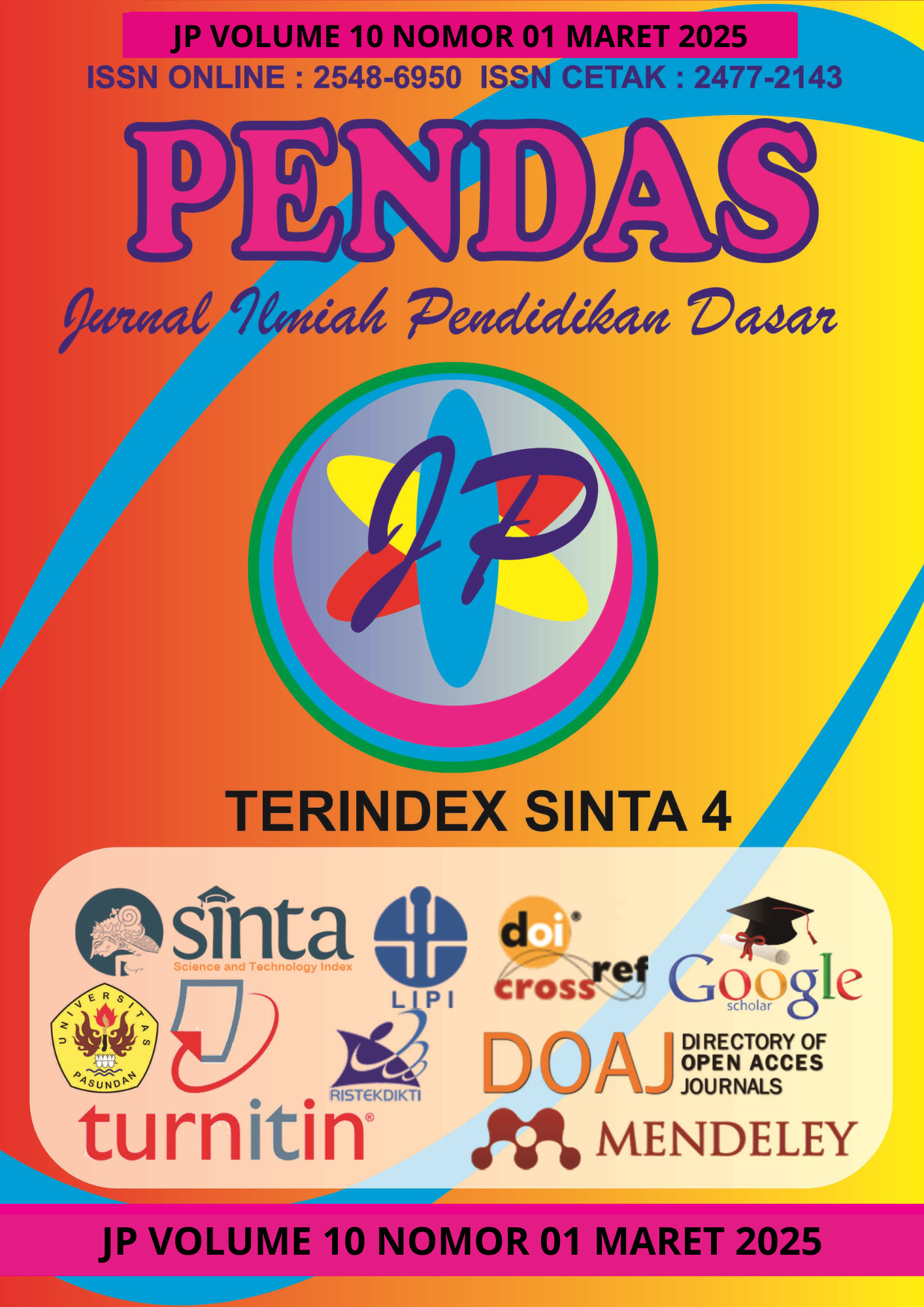Pengaruh Model Problem Based Learning berbantuan Geogebra terhadap Kemampuan Numerasi Peserta Didik Kelas IV Sekolah Dasar
Abstract
- This research aims to determine the level of effectiveness of the Geogebraassisted Problem Based Learning Model on the Numeracy Ability of Class IV
Elementary School Students.
This research was conducted at SD Negeri 036/I Kilangan in the odd semester of
the 2024/2025 academic year. This type of research is Pre-Experimental Designs
using a quantitative approach. The research design used in this research is OneGroup Pretest-Posttest Design. Data collection techniques were obtained by
observing the implementation of educators' and students' activities and giving
essay test questions to students. Then the data is processed by comparing the
results before giving the action (pretest) with the results after giving the action
(posttest).
The research results showed that there was a significant difference between the
average initial ability score before being given treatment using the Geogebraassisted PBL model, namely 65.70 and the final average ability value after being
treated with the Geogebra-assisted PBL model, namely 85.38. Based on the
results of hypothesis testing using the T-test, a sig value was obtained. (2-tailed) is
smaller than 0.05, namely 0.005, then Ho is rejected and Ha is accepted, and the
N-Gain result is 0.59 so that the effectiveness of increasing students' numeracy
skills is categorized as moderate.
The conclusion of this research shows that the Problem Based Learning model
assisted by Geogebra is quite effective on the numeracy abilities of class IV
elementary school students.
Downloads
References
Chindy Ariska. (2022). Pengaruh
Model Pembelajaran Kooperatif
Tipe Thing Pair Share Terhadap
Kemampuan Komunikasi
Matematis Siswa Kelas V Sd
Dan Mi Di Pekanbaru.
Kasmadi, & Sunariah, N. S. (2014).
Panduan modern penelitian
kuantitatif
(Cetakan 2).
Bandung : Alfabeta, 2014.
https://inlislite.uinsuska.ac.id/opac/detailopac?id=12891Nurhaliza, N., Rustaman, N.,
Purwianingsih, W., & Salahuddin,
S. (2024). The effectiveness of
service learning-esd content in
equipping students with problemsolving skills. JPPI (Jurnal
Penelitian Pendidikan
Indonesia), 10(4), 102-109.
Isrok’atun, A. R. (2018). Model-Model
Pembelajaran Matematika (B. S.
Fatmawati (ed.); Cetakan Pe).
Sinar Grafika Offsite.
Saputra, F. A., & Khotimah, R. P.
(2023). Profil Kemampuan
Literasi Matematika dalam
Menyelesaikan Soal Berorientasi
PISA Ditinjau dari Gaya Kognitif
Siswa. Jurnal Cendekia : Jurnal
Pendidikan Matematika, 7(2),
Sastrawati, E., & Budiono, H. (2025).
Mathematics Comics Based on
Problem-Based Learning with
Illustrations of Jambi Culture.
12(1), 217–231.
Simamora, R. E., & Saragih, S.
(2019). Improving Students'
Mathematical Problem Solving
Ability and Self-Efficacy through
Guided Discovery Learning in
Local Culture
Context. International Electronic
Journal of Mathematics
Education, 14(1), 61-72.
Sugiyono, P. D. (2013). Metode
Penelitian Kuantitatif Kualitatif
dan R&D
(Edisi
19).Jakarta :Alfabeta.,2013.
Syahira, F. (2024). Keefekifan Model
Problem Based
Learning
Terhadap Kemampuan
Komunikasi Matematis Peserta
Didik Kelas V Sekolah Dasar.
(Doctoral dissertation,
Universitas Jambi).
Syamsidah & Suryani, H. (2018).
Model Problem Based Learning
(PBL) Problem. In Yogyakarta:
Deepublish. (Vol. 12, Issue
2018).
Downloads
Published
Issue
Section
License
Copyright (c) 2025 Pendas : Jurnal Ilmiah Pendidikan Dasar

This work is licensed under a Creative Commons Attribution 4.0 International License.














































